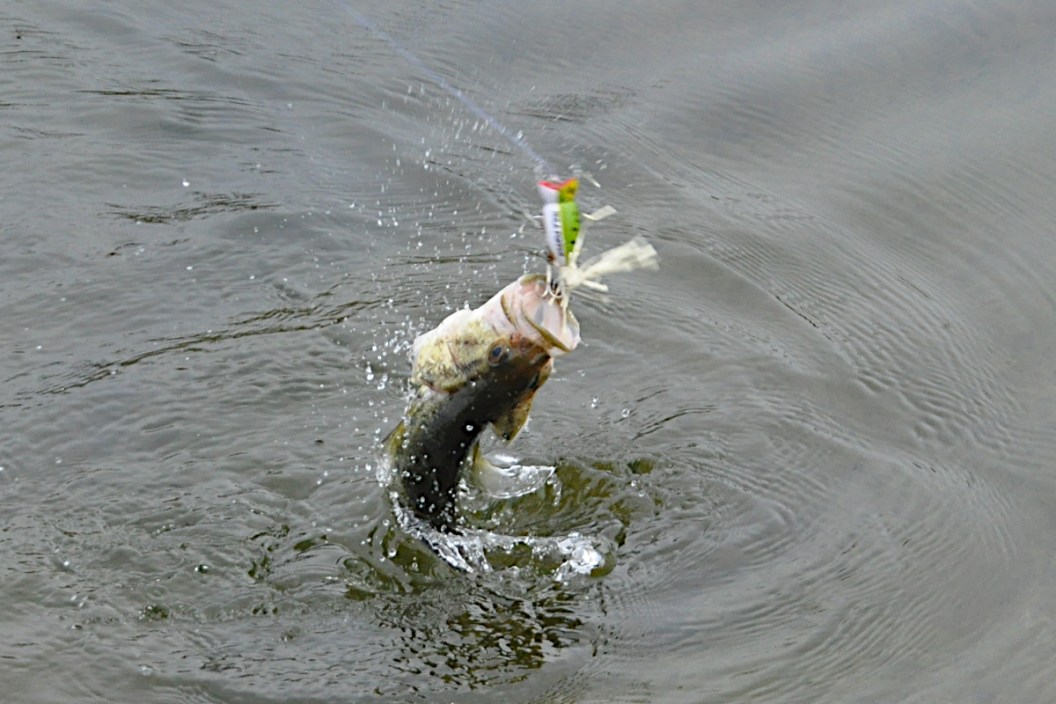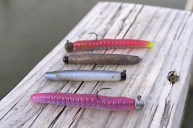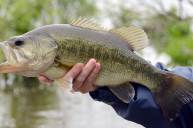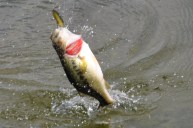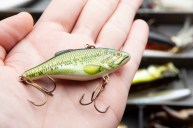Popper fishing for bass can be a lot of fun!
Topwater fishing is one of the most exciting ways to fish for bass. Nothing really compares to a big fish blowing up your lure on an early summer day at the lake.
Used properly, fishing poppers can be one of the deadliest fishing lures for both smallmouth bass and largemouth bass.
These bass lures can also be used to catch a variety of other species, but today we're going to focus on how to use them to catch bass. Here are some of the finer points of using them.
Choosing a bass popper
There are many different types of popper lures out there and new ones are being designed all the time. But keep in my mind, you can't go wrong with the classics when you're staring at the never-ending shelves in the fishing section. So, which is the best topwater? Well, that is going to be a matter of opinion.
Lures like the Arbogast Hula Popper and the Rebel Pop-R are two of my favorites, and I've caught scores of fish with both topwater poppers.
Remember, you're trying to play into the instincts of these predatory fish. Used properly, a popper closely resembles a wounded or dying baitfish. Many bass just can't help themselves when they see this type of action on the surface, they've just got to take a swipe at it if nothing else.
In recent years, companies like Heddon are working hard to make lures with bodies that reflect this wounded baitfish approach much more closely, making these lures even more effective. But what you're really looking for is the action of the concave nose. This is what is going to displace the water, make noise and attract the attention of the fish.
Generally, the more concave it is, the greater the popping and splashing action.
As with most things in life, you usually get what you pay for. The more you spend on a topwater bait, generally, the better action it will have.
Rod and tackle
Most experts agree, you're probably going to want a medium-action rod for this type of fishing. You want the rod to have some play in it, not just for working the bait, but also for setting the hooks and fighting the fish. If the fishing rod you choose is too stiff, you'll be more likely to rip the hooks out of the fish's mouth.
As for line, you're going to want monofilament or braid. Fluorocarbon lines are nice and stretchy, but these lines sink and that could adversely affect the action of the popper, so you'll want to avoid them. This is a good rule of thumb for all floating topwater lures and not just bass fishing poppers.
On another note, whatever lure you choose, make sure the hooks are sharp before you go out. Bass don't always strike a popper with the intention of eating it. Many times, it's just a genetic response of them wanting to kill it.
You'll want sharp hooks that have a better chance of digging in on a fish that's just taking a random potshot at a popper. Sometimes you can get the fish to strike again if you miss, but that isn't always a guarantee, so make sure your treble hooks are up to the task.
When & where to fish poppers
The best time to fish any sort of topwater is in calm conditions. Early morning and evening in post spawn conditions seem to be ideal times. Overcast days and even rainy days can also provide great opportunities for topwater fishing.
I love a cool, calm summer morning in clear water just after a rain. It just seems to put the fish in a surface feeding mood.
Sometimes you just know the conditions are ripe when you can hear the bass smacking the surface, either for bugs or small baitfish. If you're really lucky, you might happen into a school of bass feeding on baitfish near the surface. This sort of thing doesn't happen too often, but when it does, you can catch a lot of fish in a hurry.
For a different change of pace, try fishing a popper at night. When the summer heat starts bearing down, the bite can go stagnant during the day. But at night, largemouth bass will often start feeding.
If you think a topwater strike during the day is exciting, try it in pitch black darkness. Every strike feels and sounds bigger than it is for some reason and it makes for some heart-pounding fishing excitement.
As for where to fish topwaters, that's pretty simple. Pretty much anywhere shallow where you can find bass relating to cover.
I find most of my strikes here in Michigan tend to come up close to weed lines, stumps and other underwater cover that the bass feel comfortable in during the long summer months. Do not forget about night fishing either, especially during the hottest parts of the summer. Some of my best topwater action has come with black lures under the cover of darkness. This style of fishing will get any bass angler's blood pumping because even the little ones sound like 12-pounders in the dark of night.
Retrieval
The presentation of your popper is the most important part of this whole equation. I've found poppers can work for bass using a variety of different retrieves. But I'm getting ahead of myself a little. When fishing a popper topwater lute, I like to let it sit for a moment after it hits the water. You might be surprised at how many strikes you get before you even start retrieving the bait! In this way, fishing poppers is very different from retrieving a stickbait like a Zara spook or a big chartreuse buzzbait.
The most common way to present a popper is with short, quick twitches that splash a lot of water out and makes a huge disturbance on the surface of the water. Some anglers like to work a pause in between jerks. A retrieval might be twitch, twitch, pause, twitch, twitch pause. Often, the strike comes on the pauses.
But after years of using these lures, I have also found that sometimes that presentation can be too much. Sometimes the fish are leery of this sort of action. There are times when I've found a simple but slow and steady retrieval can also work. In a case like this, I've sometimes found a quicker continuous, steady retrieval works well.
Don't forget that you aren't trying to work splashes and a lot of noise in there by letting the nose of the bait just displace a wake on the surface. This can also mimic a wounded baitfish swimming close to the surface.
I've found that sometimes I can get bass to strike poppers after they ignored my previous cast retrieved in a more conventional manner.
In other words, don't be afraid to experiment, and be ready to switch it up if called upon.
There are a lot of ways poppers can catch fish. If you can see the fish, watch their reactions to your presentations. Often, a fish's body language will tell you if what you're doing will work or not.
If you're missing a lot of fish, they're likely just taking quick, exploratory swipes at it. Try to change it up to get a more committed strike.
Get out and try it!
Poppers are great lures that every angler should try at least once. If you have never tried topwater poppers for bass before, you seriously don't know what you're missing out on. Right now, many parts of the country are either in spawn or post spawn and as the weather heats up, conditions will be ripe for bass poppers to be effective.
So, if you've never tried it before, this is the year to do it. You'll quickly find you have a new spring and summertime fishing tradition!
For more outdoor content from Travis Smola, be sure to follow him on Twitter and check out his Geocaching and Outdoors with Travis YouTube channels.
NEXT: PETA IS NOW GOING AFTER FISHERMEN
NEXT: THE 7 BEST FISHING BACKPACKS ACCORDING TO AMAZON REVIEWS
WATCH: 2 MINUTES OF RAPID FIRE QUESTIONS WITH MIKE IACONELLI
